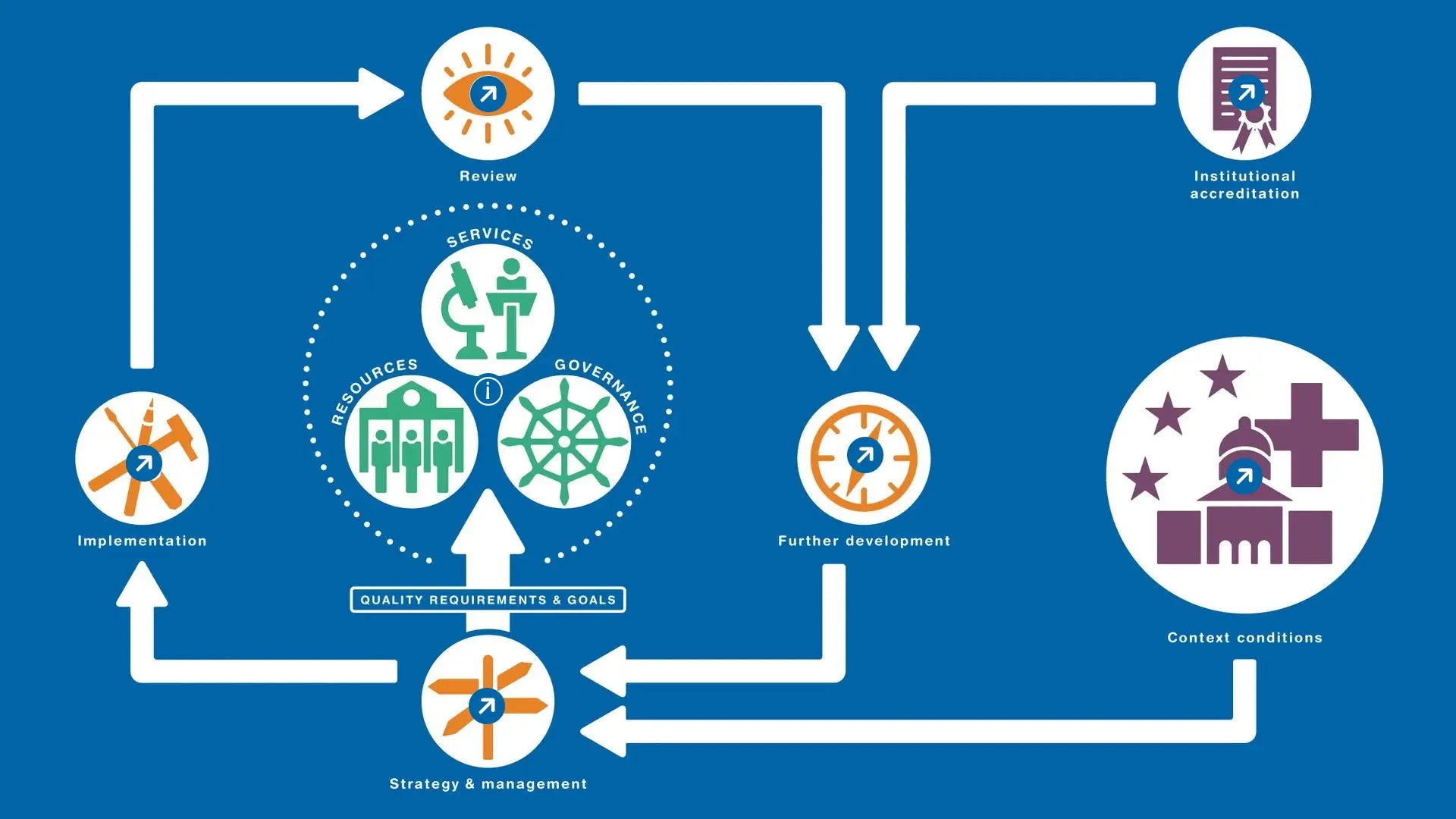Quality assurance and development at the ZHAW
The ZHAW is committed to consistently, systematically and continuously working on ensuring and enhancing its governance, services and resources. The quality framework, which governs the university-wide quality system and defines 17 overarching quality requirements, provides it with the basis to do so.
The ZHAW's quality system is firmly anchored in all of the university’s strategic foundations. These foundations give rise to quality requirements that are regularly reviewed and further developed by the ZHAW’s units as part of the continuous quality improvement cycle. As a learning organisation, the ZHAW continuously updates and improves its quality through reflection with the aim of meeting its own high standards and fulfilling both legal and social requirements. A vibrant exchange of successful practices and experiences takes place across the entire university and between the Schools.
The key tool in the ZHAW’s quality assurance efforts is the tried-and-tested informed peer review process, which combines internal reflection with dialogue with external peers that takes place on an equal footing. The objective of this process is to identify strengths, weaknesses and areas of potential and to initiate processes for improvement. This process-oriented evaluation method, which places a focus on development and change, supports the ZHAW in ensuring and enhancing its quality over the long term and establishes a quality culture characterised by transparency and reflective dialogue (concept for the informed peer review process).
Quality improvement cycle at the ZHAWas an interactive graphic

Quality at the ZHAW – responsibility and implementation
The ZHAW implements its legal mandate with respect to quality assurance in accordance with the standards of the Federal Act on Funding and Coordination of the Swiss Higher Education Sector (HEdA). The Zurich University of Applied Sciences Council is responsible for overseeing quality assurance and development at the ZHAW, where responsibility for this area lies with the Executive Board, which is headed up by the President. The Executive Board defines clear standards in the areas of governance, services and resources in the quality framework concept as well as in other university-wide policies and regulations.
The ZHAW’s quality assurance and development activities are coordinated and managed by the Higher Education Development team, which is led by Dr Katharina Sommer-von Schönberg. In her role, she heads the ZHAW Quality Commission, which includes representatives from all Schools as well as the President’s Office, the student community and Finance and Services. This commission acts as an advisory and coordinating body, supporting the implementation of the quality framework concepts and assisting the Executive Board and President in developing it further.
All ZHAW units work to ensure the operational implementation of the quality requirements. These include the Schools, Finance and Services and the President's Office as well as the Academic Affairs Unit, the Research & Development / Business Services Unit, the International Affairs Office and the “ZHAW sustainable” strategic programme and the “ZHAW entrepreneurship” and “ZHAW digital” strategic initiatives. Together, these entities ensure that quality is embedded across all areas of the ZHAW.
The quality assurance systems of universities in Switzerland are reviewed every seven years on the basis of 18 standards as defined in the Accreditation Ordinance. Where necessary, compliance is enforced with conditions. The procedure comprises a self-evaluation (self-evaluation report (PDF 2.0 MB)) and a third-party evaluation conducted by a group of at least five experts (external evaluation report (PDF 4.6 MB)), both of which are available in German only. Institutional accreditation forms the basis for the right to be designated as a university of applied sciences and is one of the necessary prerequisites for gaining access to federal funding. The Swiss Accreditation Council awarded the ZHAW institutional accreditation in its meeting of 18 December 2020.
Quality work in the ZHAW’s schools
Quality at the School of Applied Linguistics
Quality at the School of Applied Psychology (in German)
Quality at the School of Architecture, Design and Civil Engineering (in German)
Quality at the School of Health Professions (in German)
Quality at the School of Life Sciences and Facility Management (in German)
Other policies and regulations relating to quality in the ZHAW's areas of activity
Evaluation policy for academic programmes (in German)
Evaluations policy for continuing education (in German)
Regulations on the development and approval of new degree programmes (in German)
Research and development policy (in German)
Regulations of the Ethics Committee (in German)
Regulations on Academic Integrity at the ZHAW (in German)